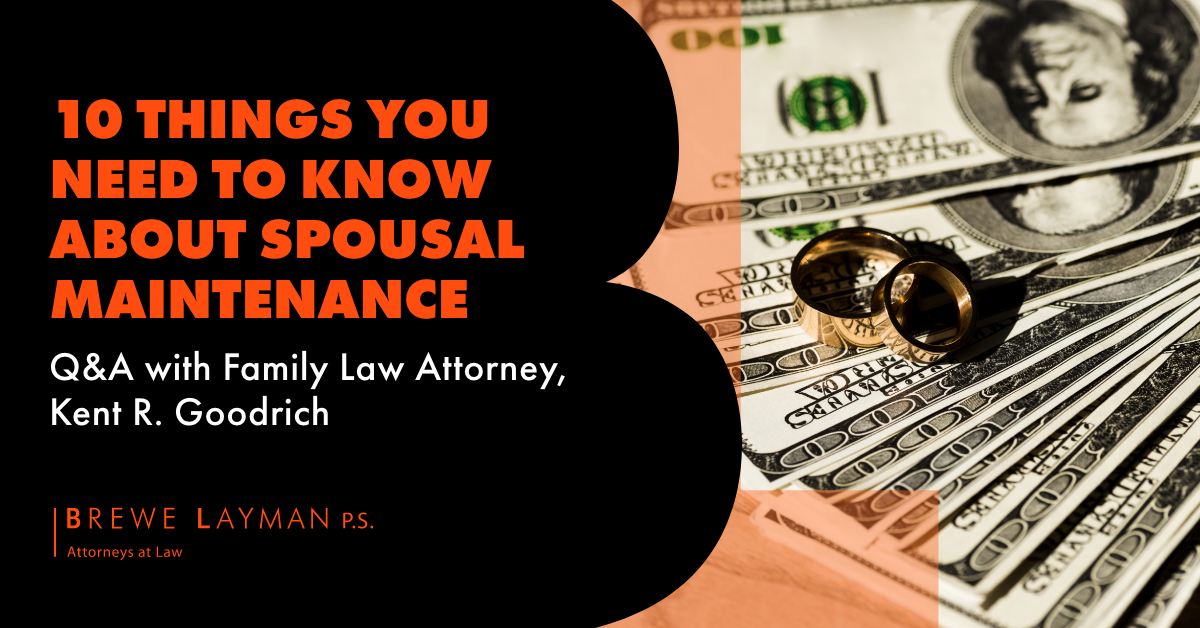10 Things You Need to Know About Spousal Maintenance

Formerly known as alimony, spousal maintenance plays a crucial role in post-divorce financial arrangements.
Navigating the realm of spousal maintenance can be a daunting task.
Spousal maintenance is not a one-size-fits-all concept, and since the court’s discretion plays a pivotal role in determining what is just and fair, it’s imperative to consult an attorney during the divorce process.

Kent Goodrich, Family Law Attorney
In this informative interview, Family Law Attorney, Kent Goodrich arms you with the insights you’ll need to understand the intricacies of spousal maintenance, shedding light on its purpose, factors influencing its determination, and the tax implications surrounding it.
1. What is spousal maintenance?
KG: Spousal maintenance (formerly known as alimony) is money paid by one ex-spouse to the other after the marriage has ended. Temporary maintenance can also be awarded to aid in supporting a spouse while divorce issues are being worked out. Maintenance can be awarded by agreement between the parties or granted by the court after proper consideration of the relevant factors. Gender is not a factor; a male, female, or non-binary spouse can be awarded maintenance, and a spouse in a same-sex marriage can receive maintenance.
2. What is the goal of maintenance?
KG: Maintenance has been described as ‘a flexible tool,’ used to equalize the parties’ financial positions and standards of living for a period after the marriage ends. The court has wide discretion in determining the amount and duration of a maintenance award. The court’s concern is granting a maintenance award that it deems ‘just’ under the circumstances.
3. What factors are considered in deciding maintenance?
KG: Under the maintenance statute, factors include a spouse’s financial resources, a spouse’s age and health, the length of the marriage, the standard of living during the marriage, and if time and education are needed for a spouse to become self-supporting. Also important is the other spouse’s ability to pay maintenance. While the court must consider the statutory factors, any other relevant factor impacting need or ability to pay may also be considered.
A shorthand answer is that one spouse’s need versus the other’s ability to pay determines if maintenance is ordered. Some simple examples: a spouse who has been married for three years, is in good health, and has a decently paying job may not have a need for maintenance. But a spouse who has been married for 30 years, has health issues, and was a homemaker throughout the marriage probably has a need.
4. What income sources are considered available to pay maintenance?
KG: Income from practically any source can be deemed available to pay maintenance. Income from employment, bonuses, interest and dividends, accounts receivable, overtime pay, and second jobs may be considered. While assets like a disability pension cannot be divided in a divorce, the disability payments can be considered income for maintenance purposes.
5. Is a spouse’s bad conduct a factor in awarding maintenance?
KG: Washington is a ‘no fault’ state, meaning that a spouse’s ‘misconduct’ such as infidelity or substance abuse, is not considered when determining maintenance. That said, the misconduct of a spouse that impacts the others’ ability to support themselves can be considered. For example, if domestic violence by one spouse hinders the other from keeping steady employment, that factor can be considered.
6. What is the length of a maintenance award?
KG: The answer varies widely depending on the parties’ circumstances. It is common for no maintenance to be awarded when the marriage is short (less than 5 years), but maintenance can be awarded for life after very long marriages. In mid-length marriages (5–25 years), it is common for one year of maintenance to be awarded for every 3–4 years of marriage. Again, what the court considers to be ‘just’ determines the duration of the maintenance award.
7. What are the tax implications of maintenance?
KG: Maintenance awarded on or after January 1, 2019, is not tax-deductible by the paying spouse. The spouse receiving maintenance does not have to report the funds received as taxable income.
8. What happens if a spouse does not pay the maintenance as ordered?
KG: The court has numerous statutory, legal, and equitable tools available to enforce a maintenance award. A common remedy is holding the non-paying spouse in contempt for failing to follow the court’s maintenance order. The State of Washington can also assist a receiving spouse in enforcing and collecting a maintenance award.
9. Can a maintenance award end early, be changed or modified?
KG: By statute, maintenance ends upon the death of either party or the remarriage of the receiving spouse. However, if the parties agree in writing or it is expressly ordered in the divorce decree, maintenance can survive death or remarriage.
Unless the parties have agreed that a maintenance award will not be modifiable, the court may modify the award if there has been a substantial change in circumstances since the order was entered. The change must impact the financial needs of the receiving spouse or the other spouse’s ability to pay. The change cannot be speculative; it must have already occurred.
A recurring question is whether a changed situation amounts to substantial change. For example, a paying spouse whose income has decreased by $300 per month probably hasn’t asserted a substantial change, but a $3,000 decrease could very well be substantial. As when making an initial maintenance decision, the court will balance one spouse’s need vs. the other’s ability to pay maintenance.
10. Does Brewe Layman represent clients who need assistance in establishing, terminating, or adjusting maintenance?
KG: Yes, we do. Give one of our attorneys a call to discuss your situation.
It’s important to keep in mind that spousal maintenance is a complex matter, and its outcomes can vary depending on individual circumstances and court discretion. Our team is dedicated to offering expert guidance tailored to your specific situation, helping you navigate this challenging process and achieve the most favorable resolution possible.
– – –
QUESTIONS?
Brewe Layman is working diligently, adeptly and tenaciously with new and existing clients to ensure you’re supported throughout the course of your case or matter. We take pride in bringing you experienced and ethical legal representation in a manner that feels surprisingly approachable. If you have any questions or are interested in scheduling an appointment, please use the form below:
